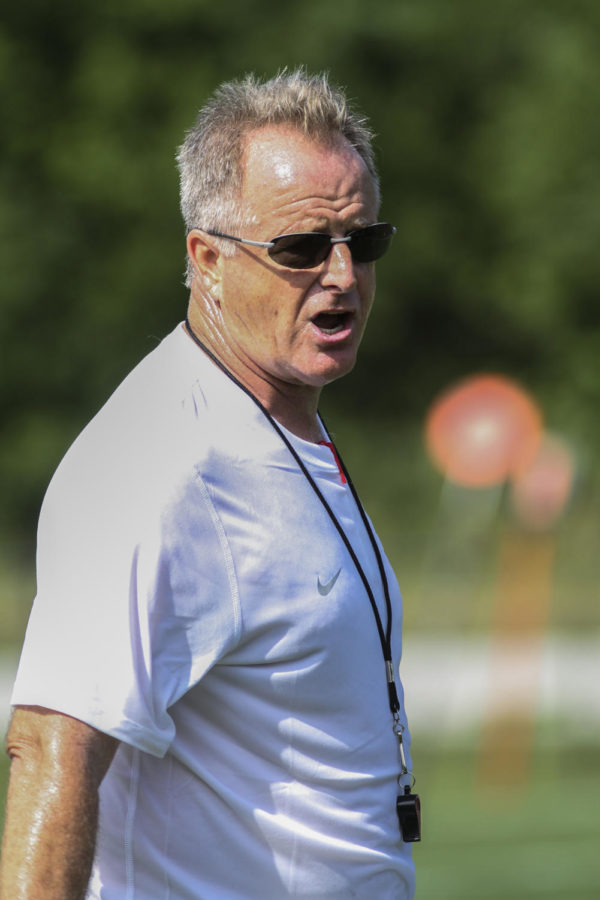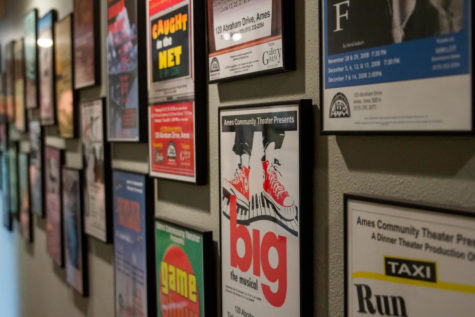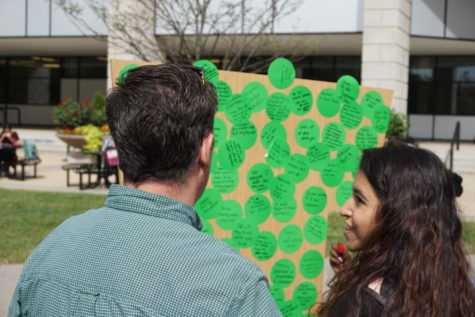Where he’s supposed to be: Stan Eggen builds on Curtis Bray’s work
Kelby Wingert/Iowa State Daily
Stan Eggen coaches the defensive ends at the first fall practice on Aug. 4, 2014.
September 5, 2014
Stan Eggen’s voice is hoarse, either from a seasonal bug or the hours he has spent behind blocking dummies during the first week of fall camp. He’s not quite sure which one it is.
On his first media day as defensive ends coach at Iowa State, Eggen stands near the east sideline, the same one he will be prowling all season. He stares out into the chaos that is unfolding in front of cameras and microphones and — despite the sweat above his brow — comments on the favorable temperature.
“I’m enjoying the weather, that’s for sure,” Eggen said. “I’ve done this long enough now where a lot of them [media days] just melt you and it drains you, but I’m loving it. This is good.”
It’s easy to tell that Eggen is taking in everything about being a Cyclone. Despite his hoarse voice, he talks excitedly about the upcoming season and even as more sweat forms on his brow, he is excited about being outside and on the field at media day.
It’s the place where Eggen wants to be.
But, if you look back to the way things were for ISU football a year ago, it’s not a place he’s supposed to be.
January 15, 2014
Curtis Bray knew defense.
Bray grew up in Monroeville, Pa., and was a three-sport standout at Gateway High School. In 1987, Bray introduced the country to his defensive prowess, becoming the first defensive player to be named the Gatorade National High School Football Player of the Year. The player that won the award in 1986: a running back from Pensacola, Fla., named Emmit Smith.
Out of high school, Bray was recruited by several powerhouse football programs and even some Ivy League schools, but Bray kept close to home and chose to play at the University of Pittsburgh.
At the end of his playing days at Pittsburgh, Bray had racked up 170 tackles on the field and earned a bachelor’s degree in economics. Like many collegiate players, Bray turned his focus to coaching.
In the early 2000s, Bray made his way back to Pittsburgh where he met ISU football coach Paul Rhoads, who was the defensive coordinator at the time. When Rhoads accepted the head coaching job at Iowa State, Bray jumped on board as defensive ends coach.
Bray quickly became known as a player’s coach — someone the athletes could go to for anything, not just football.
“He was a great mentor, someone you could go to and talk about things and he was always cracking jokes and was a very likeable guy,” said defensive end Cory Morrissey. “He made you feel like a person, not just a player.”
When Morrissey transferred to Iowa State from Iowa Western Community College, he said that the bond he and Bray developed was almost instant as they worked together throughout spring football and summer workouts.
Bray was always laughing, conversing and cracking jokes.
“When you come in as a young guy, you’re always scared of the coach, but he always made you feel comfortable right away and you could tell he cared about his players from the way he treated the older guys,” Morrissey said.
Bray’s bond with not only Morrissey but everyone on the ISU football team made the morning of January 15, 2014, that much harder.
While walking into the Bergstrom Football Complex for a 7 a.m. staff meeting, he collapsed and was taken to the hospital where he died of a pulmonary embolism.
“Curtis Bray was a dear friend to me and to all he ever came in contact with,” ISU coach Paul Rhoads said in a statement issued after Bray’s death. “He was a trusted and loyal assistant coach who always put the kids and the team in front of his work. We will miss him dearly.”
In the blink of an eye, ISU football was without a friend, colleague and mentor. There was a hole to fill that was larger than a coaching position.
It’s a unique and daunting situation for any coach, but Eggen was up for the task.
Continuing Bray’s work
When Eggen was approached about the job opening at Iowa State, there was no question as to if he wanted it or not.
But Eggen is a family man, and that’s who he consulted with first. Eggen spent five years as the defensive line coach and recruiting coordinator at Louisiana Tech. All three of his daughters — Sloane, Paige and Shelby — will graduate from Louisiana Tech.
Eggen’s family was comfortable with the move and once he got to Iowa State, Eggen said he didn’t have to change much of what the defensive ends were doing.
“I’m replacing somebody that was doing a great job,” Eggen said. “They are well-coached and I’m going to continue to build, but I still have to do it within my personality to show them that I’m real. I can’t be somebody that I’m not. When you do that, players see that.”
The first thing Eggen had to do was gain the trust of his players, including Morrissey, the unquestioned leader of the defense.
“Any coach in this business that does a good job or is well-liked as Curtis Bray, he won the trust of his players,” Eggen said. “I think that was part of what I had to do was win Cory’s trust and know that I wanted to continue to build on what [Bray] had done even if there was a certain phrase or a term I use differently.”
Morrissey said the transition went as smooth as possible, given the circumstance into which Eggen came.
“He gets after us, but then you realize the players he’s coached in the past,” Morrissey said. “He’s coached for how many years at these big time schools where he has produced so many players, and you just know the experience he has.”
More than a dozen of Eggen’s former players have been drafted into the NFL, and more than 20 have signed NFL contracts.
So, as Eggen stands on the east sideline on media day, his voice becoming quieter and raspier as he fields more questions, it’s clear this is where he is supposed to be.
Then he is asked a question about Morrissey’s NFL potential.
“Cory Morrissey is what he is because of the number of years Coach Bray had him, and I leave all that stuff to the NFL scouts and coaches of who is and who isn’t a player,” Eggen said, his eye contact becoming stronger and tone more serious. “But if I had anything to do with it and I was in the NFL and when they come and ask, Cory Morrissey is a player you had better look at because he’s pretty special.”

















